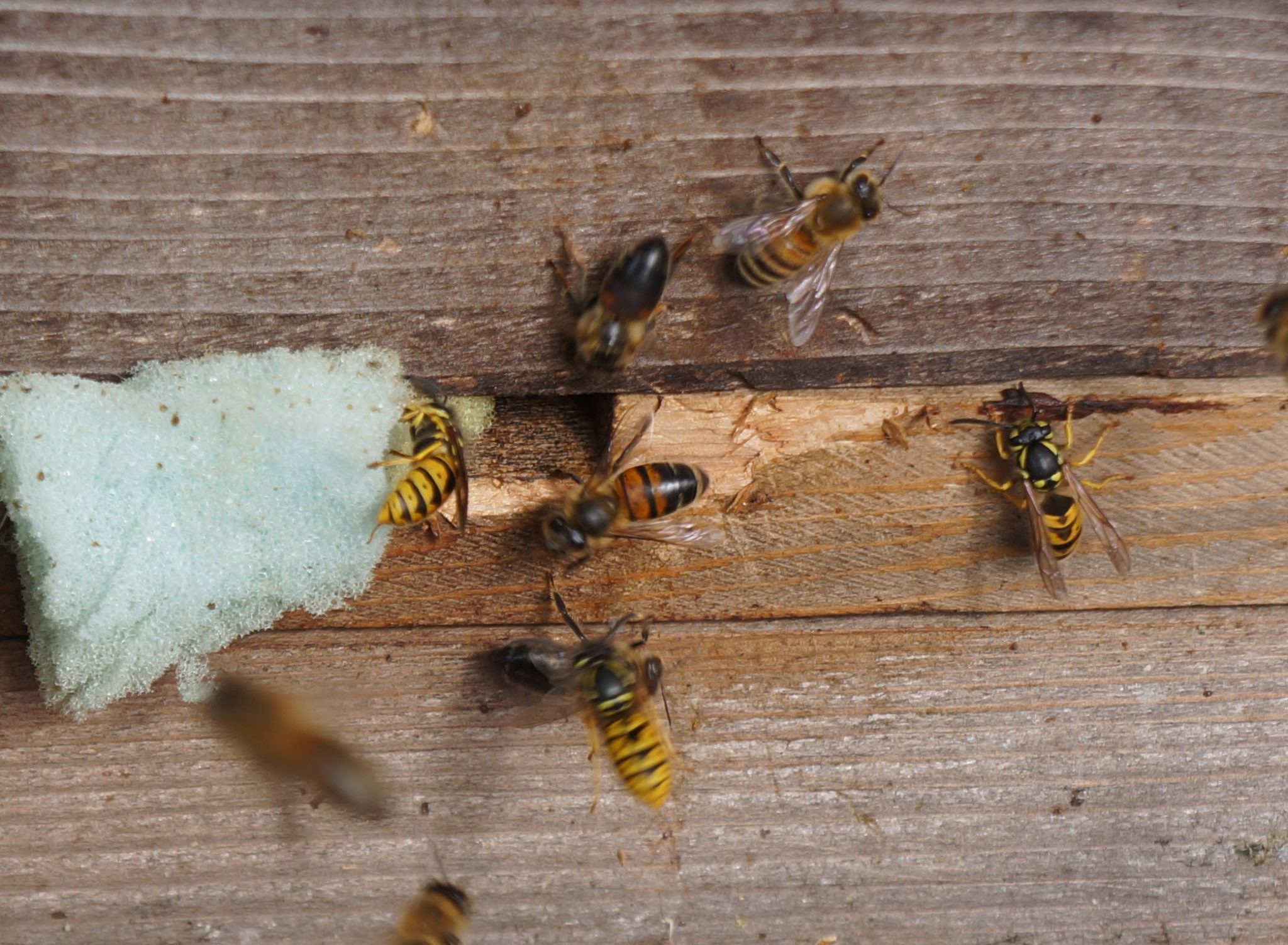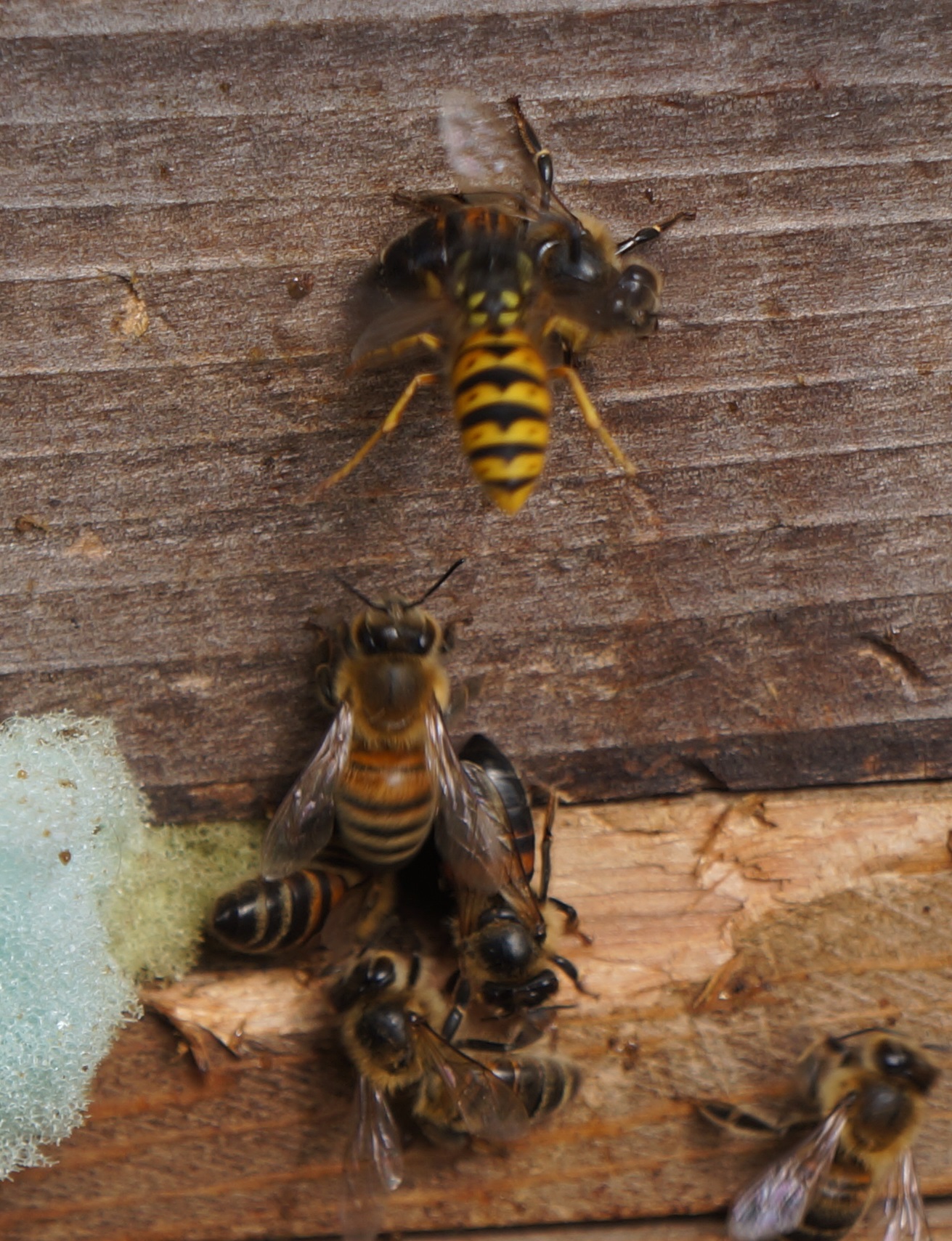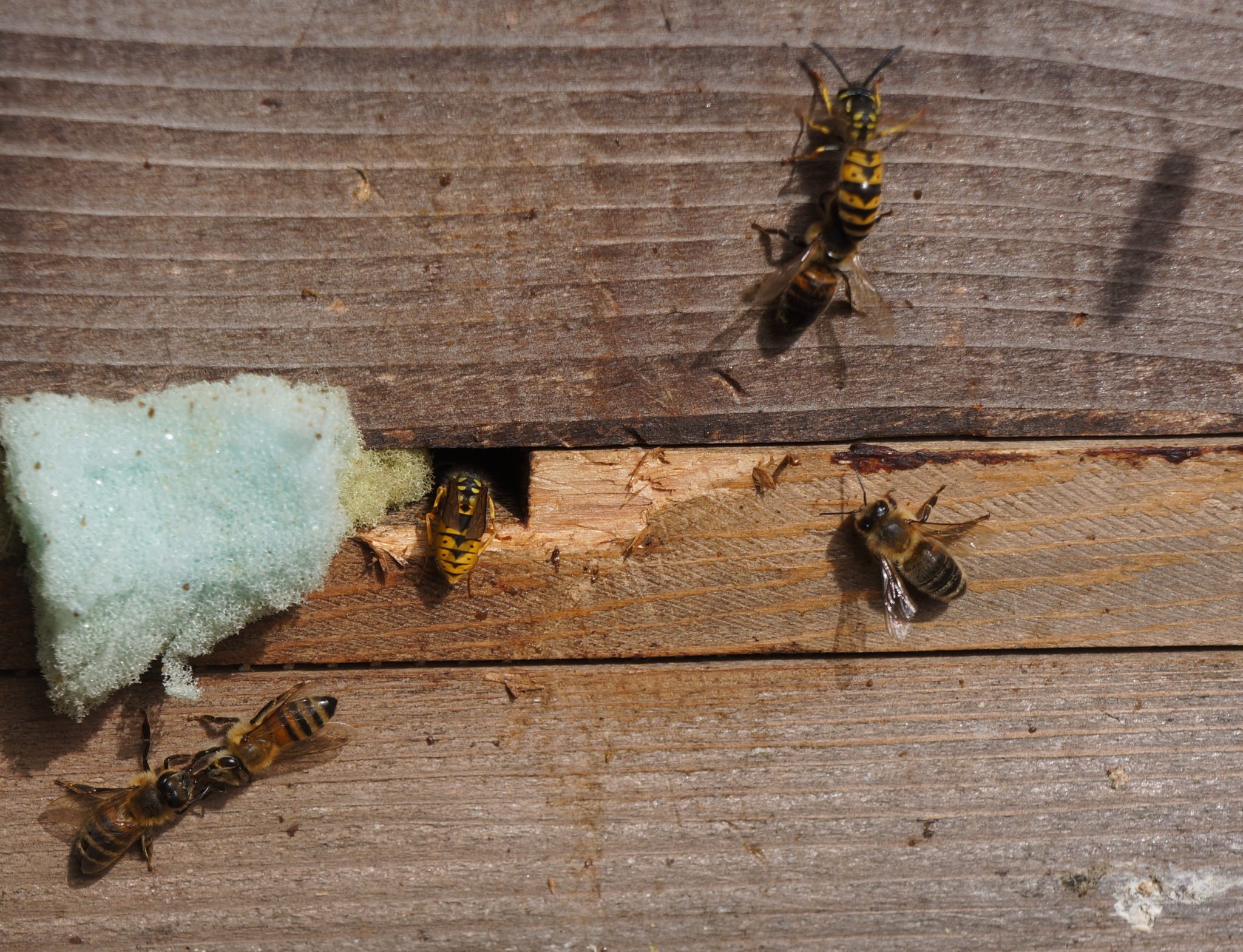 Abraham Lincoln
If given the truth, the people can be depended upon to meet any national crisis...
Abraham Lincoln
If given the truth, the people can be depended upon to meet any national crisis...
 Guildford news...
for Guildford people, brought to you by Guildford reporters - Guildford's own news service
Guildford news...
for Guildford people, brought to you by Guildford reporters - Guildford's own news service
Beekeeper’s Notes September 2018: Don’t Save The Bee?
Published on: 1 Sep, 2018
Updated on: 3 Sep, 2018
Hugh Coakley keeps bees in Worplesdon. He talks about bees battling wasps and thoughts on saving individual bees.
As every year, the wasps are at it again. Their colonies are closing down so they are desperately hunting for the sugar they are not getting back at their own home.
They pester picnics, feed on festering fruit and mount raids on bee hives like ninja burglars.

I have closed this hive entrance to little more than the width of a bee to give the bees the best chance to defend against the wasps. But it is hard to guard against such persistent attacks from the strikingly beautiful but deadly wasps. Click on the images to enlarge them in a new window.
They will have a go at any hive but especially a small hive which is vulnerable and offers meat and drink to the hungry wasp.
They are so quick to sneak past the guard bees. Once they are past the hive entrance, they seem to be largely left unmolested by the bees both inside the hive and when they leave. The bees seem to not notice them.
I have read somewhere that the wasp adopts the hive ‘smell’ to disguise its presence and avoid further attention by the home bees. Interesting if it is true.
But what about ‘Don’t save the bee’?
There has been a lot in the press about people saving single distressed bees by feeding them tiny amounts of sugared water on a teaspoon or a piece of tissue.
I know how they feel because I take care of individual insects as well. When we get bees or wasps in the house, as we inevitably do during honey extraction, I don’t like to see them trapped so I lift them outside on my finger or in a jar.
People worry about the decline in bee numbers and even some bumble bees being threatened with extinction. So, saving a bee in trouble has got to be the right thing to do.
But is the warm feeling from doing good misplaced here?
Typically, a bee comes from a colony which is 20,000 to 50,000 strong. They live for about six weeks at this time of year. So there is a huge turnover of bees from all colonies.
Insect numbers are vast. 250,000 bee colonies in the UK, 1,000 bees dying per colony per day over the summer. That’s 250 million bees dead each day.
The bee on the ground is one of the millions, every day, that has lived its allotted lifespan. It will die very shortly despite it being revived by a drop of syrup.
Helping one bee like this is like peeing on a forest fire – good intentions but not remotely influential on the outcome of the bee population.
So, saving the bee on the ground is good thing but it must not be all we do as it has little or no impact on bees at all.
There are better ways to help bees and other insects.

Click on cartoon for Dragon story: Public Asked for Views on SCC’s Proposal for Reduced Speed Limits


Recent Articles
- Local MPs Vote in Favour of Assisted Dying
- Merger Between Reigate & Banstead and Crawley Councils Ruled Out
- ‘Politics Is Not Always a Kind Place’ Says Dismissed Lead Councillor
- Letter: It’s Almost Like We Have Been Abandoned By the Council
- Failure of Woking’s Over-ambitious Project Acknowledged
- Comment: What Can Be Done About Guildford’s Biggest Empty Shop?
- Mayor’s Diary: June 20 – July 6
- A281 At Shalford Has Now Reopened Following Repairs to Damaged Roof
- Frimley Park at the Beginning of the Hospital Rebuild Queue
- Letter: Council Has Quietly Relieved Developer of £Million Obligation


Search in Site
Media Gallery
Dragon Interview: Local Artist Leaves Her Mark At One of England’s Most Historic Buildings
January 21, 2023 / No Comment / Read MoreDragon Interview: Lib Dem Planning Chair: ‘Current Policy Doesn’t Work for Local People’
January 19, 2023 / No Comment / Read MoreA3 Tunnel in Guildford ‘Necessary’ for New Homes, Says Guildford’s MP
January 10, 2023 / No Comment / Read More‘Madness’ for London Road Scheme to Go Ahead Against ‘Huge Opposition’, Says SCC Leader
January 6, 2023 / No Comment / Read MoreCouncillor’s Son Starts Campaign for More Consultation on North Street Plan
December 30, 2022 / No Comment / Read MoreCounty Council Climbs Down Over London Road Works – Further ‘Engagement’ Period Announced
December 14, 2022 / No Comment / Read MoreDragon Interview: GBC Reaction to the Government’s Expected Decision to Relax Housing Targets
December 7, 2022 / No Comment / Read MoreHow Can Our Town Centre Businesses Recover? Watch the Shop Front Debate
May 18, 2020 / No Comment / Read More








Recent Comments